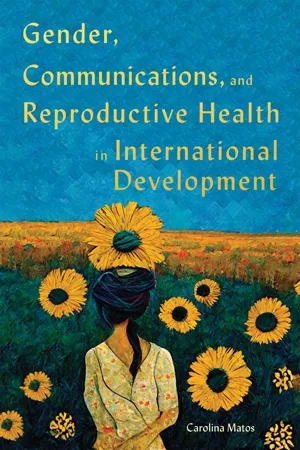
Gender, Communications, and Reproductive Health in International Development
- English
- ePUB (mobile friendly)
- Available on iOS & Android
Gender, Communications, and Reproductive Health in International Development
About this book
To this day, women globally are subjected to forms of control over their bodies, and their ability to exercise their reproductive rights in particular is still constrained. Amid a rise of challenges to the advancement of women's rights, including the recent overturning of Roe v. Wade in the United States, sexual and reproductive health rights are at the forefront of conversations about the advancement of gender equality.
To determine how communications are used strategically to shape policy, Carolina Matos explores fifty-two feminist and health NGOs from across the world and how they are improving discourse on sexuality and reproductive health in the public sphere. She investigates how these organizations are making use of communications amid various contemporary challenges, including the proliferation of misinformation about women's rights and health in the public sphere due to the actions of oppositional far-right nationalist groups. Through original in-depth interviews within the NGOs and empirical research of the institutions' online presences, Matos unpacks the complexities of the relationship between women's health, communications, and development, contributing to the fields of development, health communications, and gender studies, and advancing the debate on the role of feminist NGOs in advocating for women's rights.
With a postcolonial critique of the role of NGOs in development, Matos illuminates the strategic use of communications in the mediation and advocacy of gender equality and reproductive health.
Frequently asked questions
- Essential is ideal for learners and professionals who enjoy exploring a wide range of subjects. Access the Essential Library with 800,000+ trusted titles and best-sellers across business, personal growth, and the humanities. Includes unlimited reading time and Standard Read Aloud voice.
- Complete: Perfect for advanced learners and researchers needing full, unrestricted access. Unlock 1.4M+ books across hundreds of subjects, including academic and specialized titles. The Complete Plan also includes advanced features like Premium Read Aloud and Research Assistant.
Please note we cannot support devices running on iOS 13 and Android 7 or earlier. Learn more about using the app.
Information
Table of contents
- Cover
- Copyright
- Contents
- Tables
- Acknowledgements
- Abbreviations
- Introduction
- 1 Gender, Communications, and Women’s Reproductive Rights in International Development An Assessment
- 2 Transnational Feminism, the ‘Female Body’, and Global Gender Justice Defining ‘Sexual and Reproductive Health and Rights’
- 3 ‘Northern’ and ‘Southern’ NGOs and Advocacy on ‘Female Bodies’ and Reproductive Health
- 4 Latin American Feminisms and the Struggle for Gender Equality and SRHR in Brazil and Beyond
- 5 Health Advocacy and Feminist Activism for SRHR in South Asia The Indian Case
- 6 Development Communications and Advocacy for Women’s Health and Rights Why It Matters
- 7 Making Development Work for Women Assessing Health Communications, Development Campaigns, and Entertainment-Education
- 8 NGOs, Advocacy Communications, and Feminist Digital Activism on Sexual and Reproductive Health and Rights
- 9 Content Analysis of Institutional Websites and NGO Communication Strategies From Family Planning 2020 to Anis Brasil
- 10 Deconstructing ‘Gender Ideology’ Myths and Digital Storytelling through Critical Discourse Analysis A Case Study of NGOs’ Social Media Engagement on Twitter and Facebook
- 11 The NGOs’ Blog Posts and Digital Storytelling on SRHRA Critical Examination
- 12 Social Media and Advocacy Communications from South Asian NGOs Working on Sexuality and Reproductive Health
- 13 Gender Development, Women’s Reproductive Health, and Sexual Rights in Challenging Times
- APPENDICES
- APPENDIX A
- APPENDIX B
- APPENDIX C
- APPENDIX D
- APPENDIX E
- APPENDIX F
- Notes
- References
- Index